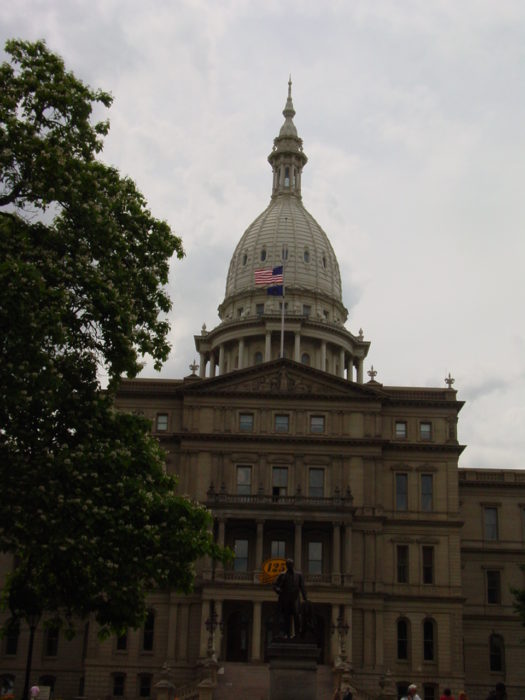
Article courtesy of MIRS News Services
(FLINT) — The select Michigan voters picked to grill the two Democratic presidential candidates at tonight’s debate weren’t interested in theoretical policy points.
They were real people with real issues — A Flint resident who wasn’t sure government could be trusted after the water crisis. A parent concerned that her child attending Detroit Public Schools is getting a subpar education in crumbling facilities. A parent watching his child recover in the hospital after she was one of the victims of the Kalamazoo mass shooting.
Nearly 40 minutes of the two-hour Democratic debate hosted by CNN in Flint focused on how Hillary CLINTON and Bernie SANDERS would specifically improve the lives of the people of Michigan, covering issues such as what should be done about fixing Flint infrastructure, how to hold those responsible for the Flint water crisis accountable, how education can be improved in cities like Detroit and how mass shootings can be curbed.
On Flint, both candidates have now called on Gov. Rick SNYDER to resign. Sanders had previously asked for his resignation, and Clinton had previously condemned the situation and made it one of her main campaign issues. But in her opening remarks tonight, Clinton took her criticism a step further.
“The Governor should resign, or be recalled, and we should support the efforts of citizens attempting to achieve that,” she said. “But that is not enough. We have to focus on what must be done to help the people of Flint.”
As far as specific fixes, Clinton said the federal government should be focused on infrastructure improvements, and the state should be sending rainy day fund money to Flint immediately. The state Legislature has already approved several million dollars in relief efforts for Flint residents.
“It is raining lead in Flint, and the state is derelict in not coming forward with the money that is required,” she said.
Sanders said that his meetings with Flint residents “literally shattered” him and that the situation is a disgrace beyond belief, adding that he is shocked that the water rates in Flint are three times higher than his own in Vermont.
“Children in America should not be poisoned,” he said, adding that the Centers for Disease Control should examine every child and adult in the community and also calling for infrastructure improvements throughout the country.
When asked by moderator Anderson COOPER whether they as president would fire the head of the Environmental Protection Agency, the candidates demurred, but said anyone who knew about what was happening and did not act appropriately should be fired.
Clinton and Sanders both said they were not in a position to answer a question from Don LEMON on whether anyone should face criminal charges in relation to the Flint water crisis.
Both candidates strongly reiterated that this was more than a political issue for them, noting that they have long fought for residents like those in Flint and would continue to do so.
The recent killings in Kalamazoo also sparked a heated debate over the candidates’ differing opinions on how the country should handle its problem with mass shootings.
Kalamazoo resident Gene KOPF, whose daughter Abigail is slowly recovering from her injuries, wanted to know how the candidates would work to curb the “serious epidemic.”
“I don’t want to hear about mental health or criminal background checks, because that doesn’t work,” he added.
The question led to a heated discussion about how guns should be regulated in the country, particularly on the issue of whether manufacturers should be held liable if a person uses their product to commit a serious crime.
“I believe so strongly, Gene, that giving immunity to gun makers and sellers was a terrible mistake,” Clinton said. “I would very seriously move to repeal that . . . making sure gun makers and sellers, like any other business, can be held accountable.”
Sanders said he believes the government should be doing everything it can to minimize the possibility of mass killings in the country, but disagrees with saddling manufacturers with liability for selling guns to criminals.
Punishing those who legally sell guns is “talking about ending gun manufacturing in America,” he said.
Clinton also hammered Sanders on his vote against the automotive bailout funding that she said ended up saving the automotive industry — a topic that has continued to be popular among national politicians visiting Michigan since 2008.
Tying the issue into her argument that Sanders is a one-issue candidate, Clinton said that saving the automotive industry was crucial to helping the middle class and that even though it wasn’t perfect legislation; leaders have to make hard choices.
“If everybody had voted the way he did, I believe the auto industry would have collapsed, taking 4 million jobs with it,” she said.
The auto bailout legislation ended up getting rolled in with the “Wall Street bailout,” which Sanders is vehemently against. Sanders has argued those responsible for the reckless and greedy behavior that caused the crisis should pay for it.
“I will be damned if it was the working people of this country who have to bail out the crooks,” he said.
The state of Detroit Public Schools also factored into the debate, with a mother suing DPS asked how the candidates would step up to ensure policies and procedures are in place to help suffering Detroit students and others throughout the country.
Sanders said the conversation in the country needs to shift from providing tax breaks to businesses to treating children and the nation’s most vulnerable.
“We should be ashamed of how we treat our kids and our senior citizens,” he said. “Somehow we cannot do what other countries around the world do . . . we’ve got to change our national priorities.”
Clinton said the federal government should work to end emergency management once and for all, returning the schools to Detroit residents.